Did you miss Discovery Days, or do you want more information on the topics discussed? You’re in luck! Scroll down to read more!
If you would prefer to hear full audio recordings of Discovery Days presentations, click here.
About Discovery Days: Discovery Days is the Foundation’s largest educational program each year and an opportunity for members and guests to better understand urgent issues facing our community and how philanthropy can make the most impact. Experts informed us in each of our five Pooled Grant funding areas: Arts, Education, Environment, Health, and Human Services. This year, we also held a special session on Philanthropy in honor of WWF’s 20th Anniversary. The event was held on November 4 & 10, 2015.
A huge thank you to our speakers, Discovery Day Co-Chairs (who also provided the “takeaways” below for each session!), Discovery Days Planning Committee and our sponsors: Cornerstone Advisors and Boeing.
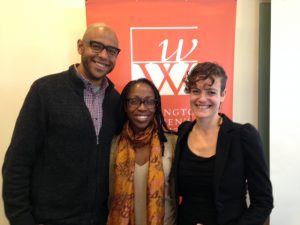
Arts and Culture: Seattle 3.0: Ensuring Universal Access to the Arts
Diana Falchuk, Deputy Manager, City of Seattle Race and Social Justice Initiative, Seattle Office for Civil Rights
Tim Lennon, Executive Director, The Vera Project
Takeaways:
Encourage all funders to look at their funding application process to find areas of implicit bias against small organizations.
While arts orgs in Seattle are working hard to increase the inclusion of diverse voices in our artistic presentations and to include people of color in our audience development, leadership of arts organizations in Seattle is overwhelmingly white.
Funders can ask organizations about the demographics of their leadership: staff, board, and those making hiring and programming decisions.
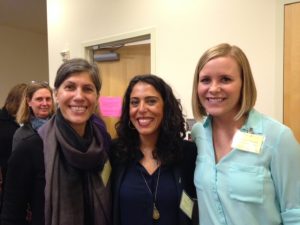
Education: Strengthening Pathways to College for ELL and First Generation Students
Roxana Norouzi, Director of Education & Integration Policy, OneAmerica
Jenee Myers Twitchell, Director, University of Washington Dream Project
Takeaways:
By 2025, 1 in 4 students will be English Language Learners. Currently, 160 different languages are spoken in South King County. Bilingualism benefits all, and some school districts are starting to recognize that by allowing native speakers to earn school credit if they successfully pass a test in their home language.
Collective action groups help agencies with content knowledge outside of their own sphere, reduces overlap and help agencies hold themselves accountable to the region’s goals, not just their own.
Constant small innovations are just as valuable as large, splashy change.
Resources:
One America’s Breaking Down Education Barriers Report
Road Map Project: ELL Work Group Action Plan
Road Map Project: 2014 Results
Guest: Give counselors the opportunity to develop skills, network together by Jenee Myers Twitchell. April 12, 2014.
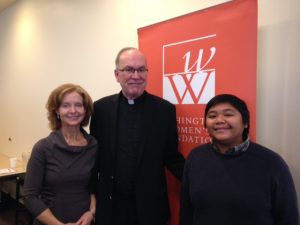
Environment: Environmental Justice
Jill Mangaliman, Executive Director, Got Green
Stephen V. Sundborg, S.J., President, Seattle University
Takeaways:
At the heart of environmental justice is the poor being seen and the excluded being listened to.We owe the biggest ecological debt to the Native Americans. This is a place where we could begin our work, by prioritizing “the people who gave us all they had.”
Be aware of environmental racism, for example: the difference in air quality in South Seattle, which is one of the worst in the country,
contributing to a 13 year life-expectancy gap compared to residents of North Seattle.
Focus activism on issues like the local food system, eliminating food deserts and increasing access to healthy, local, organic food.
Resources:
Laudato si’: A ‘Map’. America: The National Catholic Review. June 18 2015. A useful guide to interpreting the Pope’s encyclical.
The Conversion to Care for Our Common Home. A printed copy of Fr. Stephen Sundborg’s remarks to Washington Women’s Foundation on November 4, 2015.
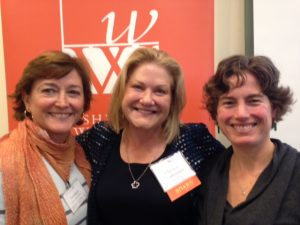
Health: Addressing Challenges in Women’s Health Care
Christine Charbonneau, Chief Executive Officer, Planned Parenthood of the Great Northwest and the Hawaiian Islands
Sarah W Prager, MD, MAS, Associate Professor and Division Director, Family Planning, University of Washington School of Medicine
Takeaways:
Only 7 states guarantee a woman’s birth control prescription will be filled and pharmacy refusals have been reported in all states, despite the fact that 98% of U.S. women access contraception at some point in their reproductive lives.
It is more difficult to access health care services in rural areas, even with the increase in health care coverage due to the Affordable Care Act.
The St. Louis CHOICE study showed that when women are educated about the efficacy rate of various birth control options, a majority choose LARCS – Long Acting Reversible Contraception. A similar program in Colorado state was able to decrease the teen pregnancy rate by 40% and the teen abortion rate by 42%.
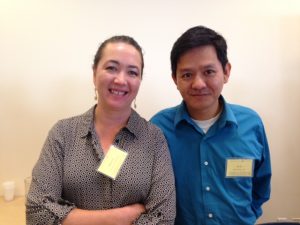
Human Services: Listening to the People – How Can Philanthropy Fund What Communities Need?
Vu Le, Executive Director, Rainier Valley Corps
Mijo Lee, Associate Director, Social Justice Fund Northwest
Takeaways:
Funders must commit to changing the systems that are creating the inequity, including their own funding models. This takes trust and time.
If you want to fund community organizing efforts, choose those that are led by the people who are impacted by the work because these leaders have the biggest sense of urgency, the best perspective on what the needs are and how to fix them.
Explore using different funding criteria to not “stack the deck” against community-based organizations and people who may traditionally be excluded from funding because they aren’t experts in the system – focusing less on 990s and balance sheets and more on leadership, partnership and accountability to constituents.
Resources:
Some of Vu Le’s blog posts:
Nonprofit Funding: Ordering a Cake and Restricting It Too
The Equity of Risk and Failure
Funders, Your Grant Application Process May Be Perpetuating Inequity
The Nonprofit Hunger Games and What We Must Do To End Them
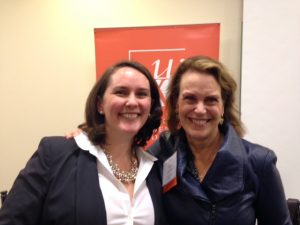
Philanthropy 3.0: Engaging With The Future of Philanthropy
Sarah Hopper, Founder of Sound Philanthropy
Kate Janeway, WWF Board of Directors
Takeaways:
Involving family, especially the younger generation, can 1) build a habit of giving; 2) educate family members on pressing community needs; and 3) build strong, positive ties across the generations.
Volunteering at the nonprofit you are interested in supporting is a good way to educate yourself about issues you are passionate about and how you can best support work being done.
Through our groundbreaking model of women-powered, collective philanthropy, Washington Women’s Foundation has given out $15 million in transformative grants that enable not-for-profit organizations to improve lives, protect the environment, advance health and education and increase access to the arts throughout Washington state.
We invite all women to join us to make a more powerful impact in our community. The challenges ahead of us are never as great as the power behind us. www.wawomensfdn.org